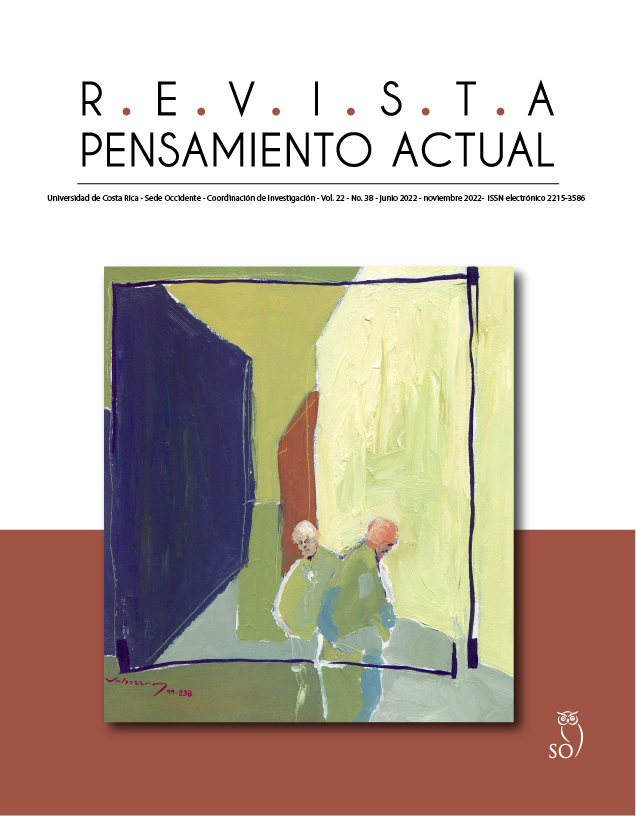Abstract
This study aims at addressing the main difficulties faced by students from the Português Intensivo 1 course at the University of Costa Rica-Western Branch during the first, second and third terms of 2018.
This paper is branched into two sections as follows: 1. Historical background of the Portuguese Language, CPLP, and its importance within the framework of dissemination of the Portuguese Language; and 2. The main difficulties in the learning of Portuguese as a foreign language as well as certain activities carried out by the teacher to overcome these difficulties during the practice and learning of the topics studied.
The instrument consisted of a questionnaire with closed and opened questions used to interview sixty-six students. The gathered data showed that the usage of verb tenses, prepositions and contractions are the major difficulties that Portuguese learners face in the learning of this language.
In light of that, the in-class activities that had more comprehension and acceptation amongst the learners to overcome their learning difficulties were the most traditional ones such as the use of exercises and practices, the use of songs and the analysis of cases.
References
Bechara, E. (2010). Estudos da Língua Portuguesa: textos de apoio. http://funag.gov.br/biblioteca/download/696-Estudos_da_lingua_portuguesa.pdf
Bechara, E. (2014). Gramática Fácil. Editora Nova Fronteira.
Brocco, A. S. (2009). A gramática em contexto Teletandem e em livros didáticos de português como língua estrangeira [Dissertação mestrado]. https://repositorio.unesp.br/handle/11449/93890.
Comunidade dos Países de Língua Portuguesa [CPLP]. (2014). 18 anos CPLP: os desafios do futuro. https://www.cplp.org/Default.aspx?ID=2611
Comunidade dos Países de Língua Portuguesa [CPLP]. (2015). Histórico – como surgiu. https://www.cplp.org/Default.aspx?ID=2752
Confederação Empresarial da CPLP. (26 de janeiro de 2021). República Democrática de São Tomé e Príncipe. http://www.cecplp.org/satildeo-tomeacute-e-priacutencipe.html
De Oliveira, G. M. & Dornelles, C. (2007). Políticas internacionales del portugués. Análisis del Real Instituto Elcano (ARI) (135). http://www.realinstitutoelcano.org/wps/portal/rielcano_es/contenido?WCM_GLOBAL_CONTEXT=/elcano/elcano_es/zonas_es/ari135-2007
Embaixada de São Tomé e Príncipe em Portugal. (12 de maio, 2022). Dados gerais. https://saotome.embaixadaportugal.mne.gov.pt/pt/sobre-sao-tome-e-principe/dados-gerais
Filipe, M. (2017). A língua portuguesa como língua de comunicação internacional. Pelos mares da língua portuguesa 3. Repositório Institucional da Universidade de Aveiro. https://ria.ua.pt/handle/10773/18281
Governo de Timor Leste. (26 de janeiro, 2021). Sobre. http://timor-leste.gov.tl/?p=547
Governo de Angola. (26 de janeiro, 2021). Sobre Angola. Recuperado de https://governo.gov.ao/ao/angola/sobre-angola/
Gobierno de Australia. DFAT. (27 de janeiro, 2021). Guinea Bissau. https://www.dfat.gov.au/geo/guinea-bissau/Pages/guinea-bissau
Governo de Cabo Verde. (20 de janeiro, 2021). Constituição. https://www.governo.cv/governo/constituicao/
Governo de Moçambique. (26 de janeiro, 2021). Informação geral. https://www.portaldogoverno.gov.mz/por/Mocambique/Informacao-Geral
Gobierno de Guinea Ecuatorial. (26 de janeiro, 2021). Información Práctica. https://www.guineaecuatorialpress.com/noticia.php?id=46
Guimarães, E. (2005). A língua portuguesa no
Brasil. Ciência e Cultura, 57(2), 24-28. http://cienciaecultura.bvs.br/scielo.php?script=sci_arttext&pid=S0009-67252005000200015&lng=en&tlng=pt
Instituto Nacional de Estatística (Ed.). (2012). Estadística da CPLP. https://www.ine.pt/xportal/xmain?xpid=INE&xpgid=ine_publicacoes&PUBLICACOESpub_boui=157850070&PUBLICACOESmodo=2
Mané, D. (1). As concepções de língua e dialeto e o preconceito sociolinguístico. Via Litterae (ISSN 2176-6800): Revista De Linguística E Teoria Literária, 4(1), 39-51. https://www.revista.ueg.br/index.php/vialitterae/article/view/5335
Metzeltin, M. (2004). Las lenguas románicas estándar (historia de su formación y de su uso). Academía de la llingua asturiana: LLiberia Llinguística.
Moreira Cézar, M. (2008)., breve história da língua portuguesa no Brasil. Caro Leitor, 114. http://www.redebim.dphdm.mar.mil.br/vinculos/000004/000004b9.pdf
Pinto, J. (2010). O ensino aprendizagem da gramática do português como L2 - um estudo de caso. https://www.clul.ulisboa.pt/files/jorge_pinto/Jorge_Pinto_Artigo__RevPLE.pdf
Pastor, S. (2004). Aprendizaje de segundas lenguas. Lingüística aplicada a la enseñanza de idiomas. Publicaciones de la Universidad de Alicante.
Reis, C. (2010). La internacionalización de la lengua portuguesa: contexto, confrontaciones y prioridades. http://www.cervantes.es/imagenes/File/lengua/jornadas/Carlos_Reis_2010IC.pdf
Ribeiro, T. (2015). Criatividade e expressão: exercícios de português para estrangeiros. Disal Editora.
Said Ali, M. (1931). Gramática Histórica da Língua Portuguesa (2ª ed.). Comp. Melhoramentos de São Paulo.
Tagliavini, C. (1973). Orígenes de las lenguas neolatinas. Fondo de Cultura Económica.
Vidos, B.E. (1959). Manual de linguística romana. Aguilar S.A. de Ediciones.

